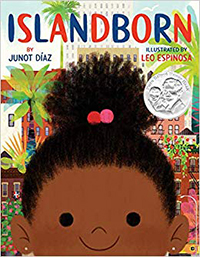Island Born by J. Díaz
DOI:
https://doi.org/10.20361/dr29443Abstract
Díaz, Junot. Island Born. Illustrated by Leo Espinosa, Dial Books for Young Readers, 2018.
Island Born by Junot Díaz tells the story of a young girl named Lola, who learns about her heritage from her friends and family. Island Born is the first children's book by Dominican-American author and Pulitzer Prize-winner Junot Díaz, with illustrations by Leo Espinosa. Díaz has said that the story was inspired by his own experience of growing up as a Dominican child in America. Díaz effectively captures both the joys and adversities of life in a diverse urban community.
The book begins with a refreshing bout of diversity, “Every kid in Lola’s school was from somewhere else ... hers was the school of faraway places.” When Lola’s teacher, Miss Obi, asks her students to draw a picture of the place they are from, Lola realizes she does not have any memories of the island where she was born. Miss Obi reassures Lola that there are other ways she can remember. She suggests Lola ask her friends and family to share their memories of the island. In doing so, Lola quickly learns about her family’s past, and the joys and struggles that are familiar to immigrant families.
The images in this book harmonize with the text in a playful way that fully engages the reader in the story about the island. Colombian-born illustrator Leo Espinosa’s images celebrate the vibrancy and diversity of the immigrant community through the depictions of Lola’s classmates, and neighbourhood friends on her journey through self-discovery. Espinosa colourfully, and vibrantly mirrors the island Lola comes from in a lively manner. The story, however, takes a somber twist when Lola learns about the dark history of her nation. Nonetheless, the serious messages continue to be presented in a cheerful kid friendly manner due to Diaz’s choice to depict a serious political leader as a legitimate monster who terrorized the people on the island.
Multicultural representation in children’s literature is vital; however, it is something that is lacking in the majority of classrooms. Classrooms are rapidly becoming more diverse, and Island Born reaches to this. Children learn powerful lessons about who is valued or devalued in society through the literature they are exposed to. When children are unable to find reflections of themselves in classroom literature, they internalize that they are not a valued member of society. However, Island Born offers a glimpse, whether it be through a mirror or a window, into the life as an immigrant student. When students are able to see something of themselves represented in classroom literature, they are able to connect back to and value their identity, culture, and experiences.
Highly Recommended: 4 out of 4 stars
Reviewer: Kristin Robb
Kristin is an After-Degree student in the Bachelor of Education program at the University of Alberta. Kristin has a passion for reading, and when she is not preoccupied with her studies you can find her volunteering in elementary school classrooms.

Published
How to Cite
Issue
Section
License
Authors who publish with this journal agree to the following terms:
- Authors retain copyright and grant the journal right of first publication with the work simultaneously licensed under a Creative Commons Attribution License that allows others to share the work with an acknowledgement of the work's authorship and initial publication in this journal.
- Authors are able to enter into separate, additional contractual arrangements for the non-exclusive distribution of the journal's published version of the work (e.g., post it to an institutional repository or publish it in a book), with an acknowledgement of its initial publication in this journal.
- Authors are permitted and encouraged to post their work online (e.g., in institutional repositories or on their website) prior to and during the submission process, as it can lead to productive exchanges, as well as earlier and greater citation of published work (See The Effect of Open Access).






